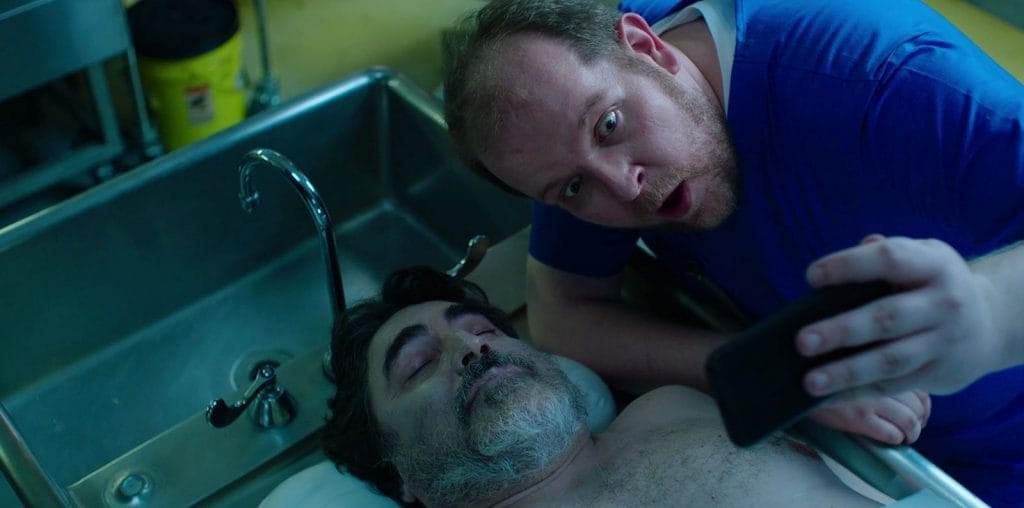$20 says Ryan Philippe and Reese Witherspoon will divorce within the next...

While much of the coverage of the Cannes Film Festival focuses on the official Competition films and major Out of Competition premieres like “Star Wars,” “Match Point” and “Kiss, Kiss, Bang, Bang,” there’s much more to the yearly showcase of world cinema. These selections offer a chance to discover less-established directors who may be on their way to greatness. And the not-quite-ready directors in these selections have the advantage of critics like myself not bothering to write about the bad films, since no one cares unless the work is exceptional.
The festival’s official sidebar is Un Certain Regard, and Director’s Fortnight and International Critic’s Week are the two established independent entities. (They admit people with festival badges and the festival includes their screenings on the schedule.)
And this year, a few titles have stood out. The best film I’ve seen in the sidebars is Bent Hamer’s “Factotum,” an adaptation of the late writer Charles Bukowski’s autobiographical novel. Matt Dillon stars as Bukowski’s alter ego Hank Chinaski, a drunkard who lives the life of a barfly—losing bad jobs, gambling, stumbling in and out of relationships with women (Lili Taylor and Marisa Tomei). Hamer, who made “Kitchen Stories,” captures the comedic antiestablishment spirit of Bukowski’s aimless life with quiet observation punctuated by moments when the power of the writer’s words come through. While the lifestyle can seem romantic, the film doesn’t ignore the negative aspects, and includes a cruel and unsettling moment of public abuse.
Matt Dillon gives one of the best performances of his career, adopting the physical presence of Bukowski beyond looking amazingly like him—he talks and drinks his beer the same way. His character’s disorganized persistence at writing is one of the few things he has stuck with during his life, because it doesn’t cost anything and can be a form of revolt that doesn’t require any strenuous work. Dillon also narrates the film, and in a few parts recites Bukowski’s writing and poetry without dramatic pretense, but in the same straightforward manner in which Bukowski wrote.
Miranda July’s Me and You and Everyone We Know, alongside “Factotum” in Director’s Fortnight, won a special prize at Sundance and should have received a higher honor. July, who has a background in performance art, offers a completely original take on American life. The movie examines personal relationships and love in a land of shopping mall shoe stores, elitist art galleries, underage sex, Internet chat rooms, improvised and ill-advised fire stunts and the human being’s ability to persist. In her first film, July demonstrates the ability to capture a version of reality while creating an off-kilter world with her amusing dialogue and visual situations, which include a brilliant sequence involving a goldfish left on the top of a moving car.
Un Certain Regard has also had some highlights. “The Death of Mister Lazarescu” by Romanian director Cristi Puiu is a two-and-a-half-hour nightmare through modern health care. It begins on a Saturday night as a 63-year-old man experiences stomach pains and a headache. He denies that his drinking is the cause of the problem to the hospital operator, to his sister over the phone, and to the neighbors who look after him while he waits for the ambulance. He ends up being repeatedly misdiagnosed—as the disease morphs from his stomach to his colon to his liver—and repeatedly moved from hospital to hospital, never actually receiving the needed surgery. Puiu fully creates the hospital environments, with their divide into people in different pay ranges, and directs the film like an unobtrusive documentary, making the pain of this old man’s death feel even more realistic.
An entirely different medical film from Hungary, “Johanna” begins during a scuzzy green and yellow hospital’s rehearsal for a crisis, as a morphine addict falls down the stairs, gets amnesia and becomes a saintly nurse. And the entire story that follows is sung. This modern opera directed by Kornel Mundruczo and composed for film by Zsofia Taller creates a dirty, expressionistic hospital as the setting for a modern Joan of Arc tale. Johanna’s divine gift comes in the form of healing the sick by having sex with them. Putting this gift to good use, however, offends the hospital hierarchy and enrages a healthy young doctor to whom Johanna won’t submit. With high contrast lighting, lead actress Orsi Toth seems to be glowing as she tries to do good in the face of traditional authority. Knowing nothing about the film going in, I was constantly surprised by its audacity and invention. Of course, the whole point of attending the sidebar selections is to be surprised.
Film Threat’s 2005 Cannes Film Festival continues throughout the week!
Check out Jeremy’s previous entry>>>
Visit the Cannes Film Festival website.
